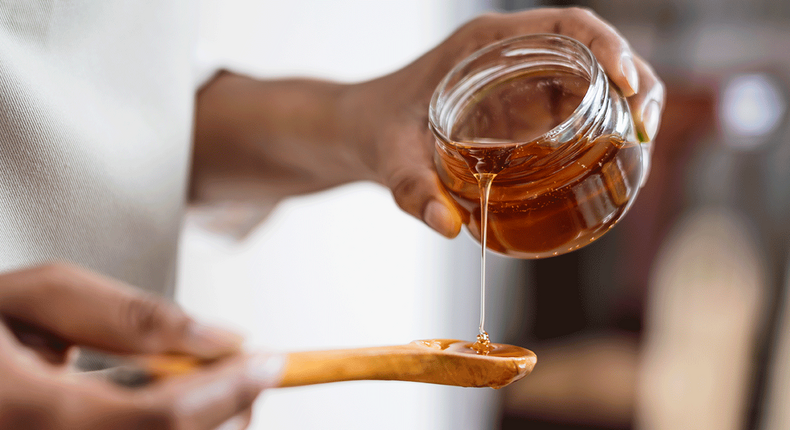Honey, the delightful and viscous substance crafted by bees, has long been cherished in various cultures worldwide. Renowned for its natural sweetness and enriched with antioxidants, vitamins, and minerals, honey stands as a favored option for individuals seeking healthier alternatives to processed sugars. However, for those managing diabetes, the question of whether honey is a suitable dietary choice often arises. In this discourse, we shall delve into this inquiry and provide insights on how individuals with diabetes can incorporate honey into their diet safely.

The glycemic index (GI) serves as a metric to gauge how swiftly a food item elevates blood sugar levels. Pure glucose acts as the benchmark, boasting a GI of 100, against which other foods are measured. Honey registers a GI of approximately 55, positioning it lower on the scale compared to several other natural sweeteners like maple syrup (GI of 54) and agave nectar (GI of 15-30).
Despite honey’s relatively moderate GI, it remains imperative to acknowledge its sugar content and its potential impact on blood sugar levels. Individuals with diabetes must exercise caution regarding their sugar intake to effectively manage their condition.
Benefits of Honey for Diabetics
Despite its sugar content, honey presents several advantages that render it a feasible option for individuals with diabetes:
1. Natural Sweetener: Honey serves as a natural sweetener endowed with antioxidants, vitamins, and minerals, positioning it as a healthier substitute for refined sugars.
2. Low Glycemic Index: With its comparatively low GI, honey may induce a more gradual rise in blood sugar levels.
3. Abundant in Antioxidants: Honey harbors antioxidants that combat oxidative stress and inflammation, common complications associated with diabetes.
4. Cough Relief: Honey exhibits natural cough-suppressing properties, offering relief to sore throats—a valuable attribute for diabetics, who may be susceptible to respiratory ailments.
Risks of Consuming Honey if You’re Diabetic
Despite its merits, it’s imperative to acknowledge the potential risks associated with honey consumption for individuals with diabetes:
1. Sugar Content: Honey remains a sugar source, and excessive consumption can elevate blood sugar levels, exacerbating diabetes symptoms.
2. Caloric Load: Honey is calorically dense, containing roughly 64 calories per tablespoon. Overindulgence can contribute to weight gain and worsen insulin resistance.
3. Medication Interactions: Honey may interact with certain medications, such as blood thinners and diabetes medications, necessitating consultation with a healthcare provider prior to consumption.
Guidelines for Consuming Honey if You’re Diabetic
If considering honey incorporation into your diet while managing diabetes, adhere to the following guidelines:
1. Healthcare Consultation: Consult with your healthcare provider to ascertain the safety of consuming honey given your individual health circumstances.
2. Moderate Intake: Limit honey consumption to 1-2 tablespoons daily to mitigate excessive sugar and calorie intake.
3. Blood Sugar Monitoring: Monitor blood sugar levels post-honey consumption to gauge its impact on your body.
4. Opt for Raw, Unfiltered Varieties: Select raw, unfiltered honey for maximal antioxidant and nutrient content compared to processed variants.
5. Pair with Protein and Healthy Fats: Combine honey with protein and healthy fats—such as nuts and seeds—to slow down sugar digestion and absorption.
Conclusion
Honey can indeed be a viable option for individuals with diabetes, provided it’s consumed judiciously and as part of a balanced diet. Its innate antioxidants, vitamins, and minerals position it favorably against refined sugars. Nevertheless, vigilance concerning sugar and calorie intake, alongside regular blood sugar monitoring, remains imperative. Before integrating honey into your dietary regimen, seek guidance from a healthcare professional, and opt for raw, unfiltered varieties to maximize its benefits. By adhering to these recommendations, individuals with diabetes can relish the sweetness of honey while effectively managing their condition.
